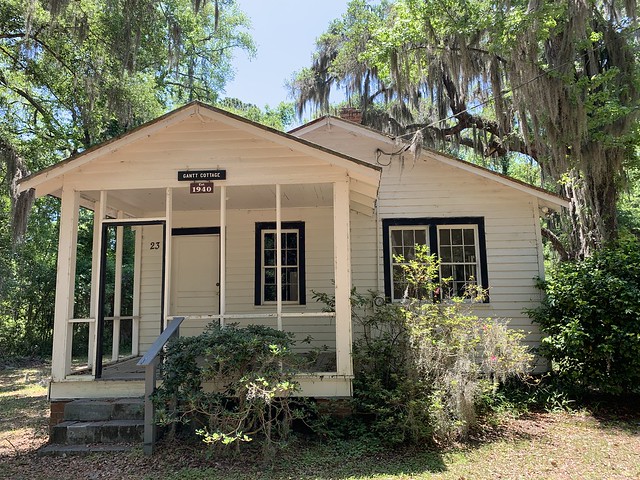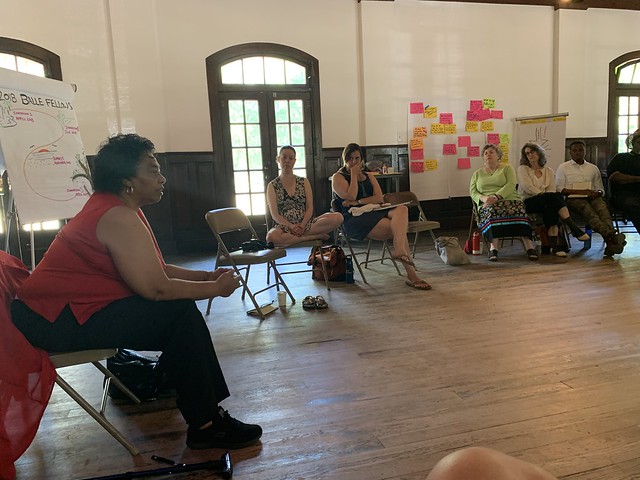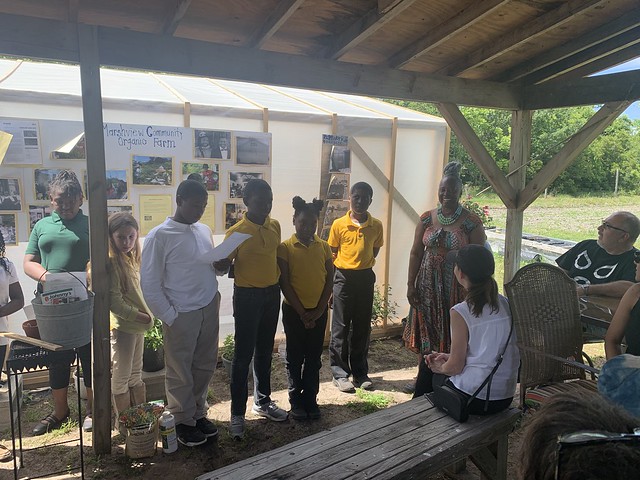By Jonah Fertig-Burd
At the end of April, I traveled down to South Carolina for an immersion with our BALLE Fellowship. BALLE (Business Alliance for Local Living Economies) brings together leaders from different sectors and regions who are working on growing local living economies. Our Local Economy Fellowship has brought together rural and urban leaders, from all over the country and Canada. There are people working to start cooperatives and grow community wealth in Tribal communities, support Black entrepreneurship and home ownership in Mississippi, food gleaners and processors in the Northeast, community lenders supporting business ownership in rural communities, community food entrepreneurs in communities of color in Oakland, CA, and many more inspiring, connected and passionate leaders. I was honored to be selected to participate in this fellowship and share our work to develop a just and equitable economy in the Northeast that is rooted in cooperative ownership.
During our week in South Carolina, we learned about the place where we were, struggles for black land and ownership, and about the local culture. We stayed at the Penn Center on St. Helena Island in the heart of Gullah/Geechee territory. The Gullah are descendants of enslaved Africans who were brought to this area of the southern coast from North Carolina to Florida. Because of the islands and mosquito-born diseases, the Gullah were relatively isolated from whites during and after slavery. So the Gullah were able to preserve and develop their own cultural identity and work to preserve that culture today. They have their own language, cuisine, and a strong artistic tradition.

The Penn Center started out as a school for formerly enslaved African-Americans in 1862. It had academic and trades programs and played a central role in the community. In the 1950s it transformed into a community education center and in the next decade became a retreat space for the Civil Rights movement. Martin Luther King retreated here to think, write and meet with other members of the Southern Christian Leadership Council. It was a tremendously meaningful place for us to meet, being aware of this history and power.

We were visited by Dr. Shirley Sherrod, a longtime leader and visionary. New Communities Land Trust was started by Shirley and Charles Sherrod in 1969 and they purchased 6,000 acres of land in Southern Georgia. It is the first community land trust in the US and has been a model for many others in the struggle to preserve land for community. They worked together with a broader group of people to farm, build homes and create community on this land. They lost their land in 1985, due to racism they experienced from the USDA in Georgia, which denied them critical support during drought years. They later joined together with many other black farmers to sue the USDA and they won a landmark settlement. New Communities is now an educational and production farm, with agricultural training and leadership development programs. Dr. Shirley Sherrod has also worked with the Federation of Southern Cooperatives helping to support market growth and technical assistance for black farmers for their agricultural practices and to support them in holding onto their land. She was the first Black woman inducted into the Cooperative Hall of Fame, in 2011 and was James Beard Leadership Award winner in 2018. Learn more about her story from a
recently released blog post in Non-Profit Quarterly based on Dr. Shirley Sherrod’s talk at the BALLE Fellowship.

On our last day, we took a tour. We first visited Marshiview Community Organic Farm, which was started by Sara Green on her family’s land. She works with youth who learn about farming, cooking, Gullah language and history, and entrepreneurship. We then visited Lands End Woodland, a 300-acre cooperative forest that was started in 1920 when 47 people pooled $300 to buy the waterfront property. This land is now preserved by the descendants of these founders who use it as a community resource and are doing forestry management on the site to generate revenue. They are being assisted by The Center for Heirs Property Preservation, which is run by Dr. Jennie L. Stephens, a Fellow in our Fellowship. The Center helps families that have a property with no will or clear title, to clear up ownership of that land so that it remains in the family. Their forestry program helps land-owners generate additional revenue from their land. We finished off our tour at Gullah Grub, a delicious restaurant run by Sara’s husband Bill Green that serves traditional Gullah food. We were treated to Carolina rice, fried fish, bbq chicken, and collard greens.
As a white person from the Northeast, this was my first experience to be on black land in the South. It was powerful to hear stories of struggle, resistance, perseverance, loss, and reclamation around the land. Our economy has made the land into a commodity that some people have a lot of, and many people do not have access to. The work I saw in the South was keeping land owned by African-Americans and protecting this important resource for survival. As we work to grow cooperative ownership of land in the Northeast, I will be inspired by the movement in the South and will carry their stories and struggle in my heart.

Thanks for this. I had the honor of hearing Dr. Sherrod speak at a food co-ops conference a few years ago. These folks who have worked so unflaggingly for their communities are really living national treasures.